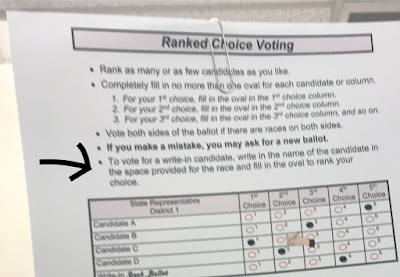Wait, what? I thought they ruled a long time ago?
Yes, they made a couple of rulings. First they issued a decision on March 25, 2022 when the Redistricting Board appealed Superior Court Judge Thomas Matthews' decision. They agreed with him on some things (particularly his calling the Eagle River Senate seats gerrymandering) but not on others (Matthews' ruling against the Board regarding the Skagway appeal and they also ruled against taking Cantwell out of the Denali Borough.
Then after the Board addressed those issues, their decision was again appealed, Judge Thomas Matthews ruled again, and on May 24, 2022 the Supreme Court removed their temporary stay on Judge Matthews' order to the Board.
BUT, these were short decisions that briefly summarized what they decided the Board needed to do. These were NOT decisions that explained their decisions.
Why do they need to explain their decisions?
The reasoning behind their decisions will help guide future Boards when they make their future redistricting maps. If they do it clearly, these will be useful guidelines as the next Board grapples with what they can and can't do.
Some things the Court ought to answer:
1. Explain what appears to some as a contradiction between past rulings that said everything within a Borough boundary is considered Socio-Economically Integrated and their finding this time that Senate pairings in Anchorage were political gerrymandering. Those two findings are not necessarily mutually exclusive, but since the Board's attorney's mantra was "everything within a Borough is SEI" the Board majority seemed to think that then they could pair any two contiguous house districts within the Municipality of Anchorage, and it would be fine. (Contiguity being the main legal criterion for a Senate pairing.) Aren't things like race, economics, political leanings part of Socio-Economic Integration? Why then are factors like race, economics, and political leanings within a single Municipality indicators of political gerrymandering? That needs to be explained. And maybe the past rulings about everything in a Borough being SEI should be adjusted to reflect the differences within a Borough as populous as the Municipality of Anchorage. Here's a post I did looking at past rulings about SEI.
[UPDATED Sept 4, 2022: Maybe this is better focused: I'd like to see the Court explain how they differentiate the criteria used to determine political gerrymandering and the criteria used for Socio-Economic Integration (SEI). If Marcum hadn't mentioned that ER would have gotten an extra Senate seat, would the other characteristics of the two paired house districts been irrelevant? At one point in the Supreme Court hearing there's a discussion between Board attorney Singer and Supreme Court Justice Warren Matthews [not to be confused with Superior Court Judge Thomas Matthews or Board attorney Matthew Singer] on terms like 'communities of interest,' and 'equal protection.' It would be nice if they could explain clearly the different concepts that Attorney Singer discussed and how the Court distinguishes between the idea that a Borough is SEI, but, as Justice Matthews pointed out, there are differences in communities of interest within the Borough of Anchorage.]
2. Address the issue of geographic contiguity. While the House districts paired in the revised map were technically contiguous, the borders that were touching were in unpopulated and roadless mountain areas. While that 'connected' the two districts physically, the communities in those two districts were geographically far apart (relative to the population of Anchorage) and not really sensible political units.
"Auto-contiguity" came up as a concept. That 'auto' refers to cars - can you drive from one part of the district to another without leaving the district? This was an issue in the Valdez/Mat-Su case and in the Eagle River Senate pairings.
I understand that being contiguous in large, roadless rural districts will sometimes require those rural Senate seats to have much less ideal connections between communities. But in urban areas where there is much greater population density, it seems more than reasonable to consider contiguity as a continuum from "more to less," than an "either/or, yes/no," evaluation. It was clear that the Board majority paired HD 22 and HD 9 with such an unusable border for political reasons. The Hickel Decision tell us that
"In addition to preventing gerrymandering, the requirement that districts be composed of relatively integrated socio-economic areas helps to ensure that a voter is not denied his or her right to an equally powerful vote."
In urban areas, extreme contiguity such as we had, should also be an indicator of possible gerrymandering, particularly when much more natural contiguity alternatives are available.
3. Explain why the Supreme Court disagreed with Judge Matthews' finding that the Board needed to pay more attention to public testimony in the Skagway case. Did they disagree with his reasoning on the Board's need to justify why they were making a decision that was contrary to the overwhelming public testimony? As I understand it, they basically said, it didn't matter since the district met the criteria for a district.
4. There was a request from Calista plaintiffs that ANCSA boundaries be found acceptable as local boundaries for the Board to use making their maps. This makes some sense in situations where those boundaries connect villages (water districts, schools, roads). But the for-profit Native corporations are just that: profit making corporations that have a lot of power. We wouldn't want corporations, say like Conoco or Monsanto, to have their own corporate political districts. I think the Native Corporations have the burden of proof here that they are sufficiently different, in ways that matter to elections, that it would be okay.
5. Also on hold has been the decision about whether the Board has to pay attorney fees for the Girdwood plaintiffs.
Does it matter when the court rules?
- There are several factors to consider in answering that question.
- How urgent is the answer?
- Elections
- The Board got out its initial brief decision out in time to have an interim map for the 2022 election. So they took care of the most urgent issue.
- The 2024 election is two years away. Candidates need to decide if they are going to run well before that.
- All of the state House districts are settled. The court has pretty much closed off any changes to them.
- There are only, potentially, two to four Senate seats that could be changed when the Board meets again to decide to just use the 2022 interim map for the rest of the decade, or if they try to tinker with the Senate seats in north/east Anchorage some more. So, at most, less than a handful of Senators might have their districts changed. AND the voters in those districts will also be affected.
- The Board
- There are still five Board members who have to meet at least one more time to decide on a permanent map for the rest of the decade. These are people who, mostly, have full time jobs. The longer it takes for the decision to come out, the greater the chances someone might no longer be available to serve.
- Board staff is, as I understand it, down to one person - Peter Torkelson. He needs to be considering his next job and if something good were offered, he'd probably have lots of reasons to take it.
- I originally wrote here, last night, that Board space was still rented and they need to dispose of the equipment and furniture they have. But this morning I got an email saying that the Board had closed down its office at the University Center and most of its furnishings and equipment have been returned to the state surplus office where they got it. But they do have laptops and data stored at a secure site.
- The Court's time limits for decisions
- Six Months Rule
- "A salary disbursement may not be issued to a superior court judge until the judge has filed with the state officer designated to issue salary disbursements an affidavit that no matter referred to the judge for opinion or decision has been uncompleted or undecided by the judge for a period of more than six months."
- Six Months Rule and the Supreme Court
- "For the Alaska Supreme Court, the six-month rule starts to run when the case is taken under advisement by the five members of the court. In order to be under advisement, the case must be ready to be decided by the court. Normally, the date the case is taken under advisement is the date of oral argument or the court's conference on the case if no oral argument is requested, although on occasion that date may be different in the event of requested supplemental briefing, reassignment to another justice, or other events that affect the date when the case is ready to be decided by the court. Once the case has been assigned to an individual justice to write the opinion, or in the words of the statute, has been "referred to the justice for opinion” (which cannot happen until the court has discussed the case after oral argument and knows which justices are in the majority), that justice has six months to complete the draft opinion and circulate it for voting by the rest of the court. This is the portion of the opinion that is within the control of the individual justice. Draft opinions are usually issued much more quickly than six months, in most cases within 90 days of the case being taken under advisement. Once all voting is complete by all individual justices, all voting suggestions have been incorporated during the reconciliation process, and any separate opinions have been prepared and voted upon, the draft is ready to be proofread and prepared for publication. About 75% of all Supreme Court appeals are published within nine months from the date they were taken under advisement."
- The Appellate Clerk added these caveats by email: "The six-month rule applies in the appellate courts, but perhaps not the way you would think. The six month clock resets each time a new draft is circulated, including draft concurrences or dissents. I cannot give you an estimate on when this opinion will be issued." and in response to my question whether it had been assigned to a judge and to whom: "Yes, the case has been assigned, but no, I cannot reveal to whom."





































